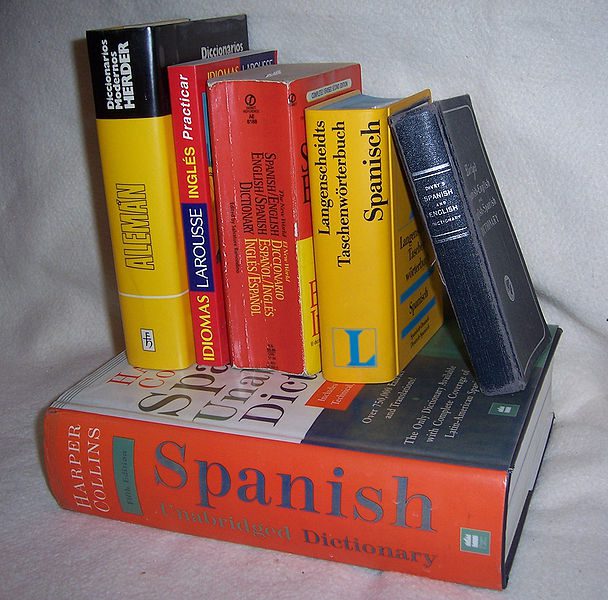![By Raysonho @ Open Grid Scheduler / Grid Engine (Own work) [Public domain], via Wikimedia Commons](https://wp-media.patheos.com/blogs/sites/533/2015/02/library.jpg)
Apparently, the white working class in the U.S. have a lot in common with the Dutchies.
Belief that kids can find their own way in the world (as distinct from needing intensive parenting, travel sports, and the like), check.
Belief that work is a means to an end, that of supporting your family, check.
Belief that there are other paths towards a happy adulthood than a college degree, let alone one from Harvard, check.
Belief that ever greater accumulation of high-status material goods isn’t particularly important to having a satisfying life, check.
Which made it very interesting to read this book, The Happiest Kids in the World, How Dutch Parents Help Their Kids by Doing Less, by Rina Mae Acosta and Michele Hutchinson, at the same time as Friday’s White Working Class. The book is written by two expats, one from London and the other from California, both solid PME (that is, if you didn’t read my earlier post, professional/managerial elite) who contrast family life in the Netherlands with their experiences in the Anglosphere, and can’t praise the country enough for the wonders of its culture, in terms of raising children and, well, pretty much everything else.
Their writing style is very personal, with each in turn telling portions of the book, about aspects of Dutch culture as they encounter it and learn about it from friends and from experts they interview. Which is fine, I suppose, except that their gushing seems to be in part due to having very distorted expectations of what child-rearing should be like, based on their prior experiences — both of them coming from that minority of Americans that views childhood as an endless quest to move from one level of prestigious school to another, starting with the “best” preschool, and adult life as one of building up your career and the number of Linkedin connections. It’s also possible that their rosy picture of Dutch families is just as distorted, coming from a narrow set of experiences and experts; if I have any Dutch readers I’d love to get their perspective.
But here’s what they have to say:
Dutch children are happy.
Not just that they show up in top spots on studies with metrics that derive “happiness levels” based on such things as crime rates and universality of healthcare, but that they generally appear to be well-adjusted.
And this is due, in part, to the fact that the primary objective, by parents and teachers alike, is for children to be happy, and, in general, to be well-adjusted and have the ability to get along with other children. There is no homework in elementary school, and only small amounts in secondary school, and no real pressure to make it into the college-bound secondary school track (an occupation in the skilled trades is considered a perfectly respectable outcome), or to do particularly well in secondary school (as long as you pass the college entrance exam, it doesn’t matter how well you did, or what your school grades were; all colleges are at the same level of rigor so there’s no Ivy League equivalent which gets you a direct pipeline into the best jobs). And of course, preschool is blissfully lacking in any sort of US-style seatwork.
Children are also expected to be independent at much younger ages that we’re used to in the U.S., at least in the year 2017. (Remember, this is a fairly new development in the U.S. — unless you’re one of those Millennials, you probably remember having the run of the neighborhood, and maybe even being able to hang out at the Meijers oasis while Mom did the shopping.) They also, since this is a cycling-obsessed country, not just in a recent uber-environmental phase, but for the past century, are expected to learn to ride their bike to school, however far it is, however many busy streets there are and however many turns the kid has to remember to not get lost — and, by the way, they don’t get a pass on nasty cold or rainy days, but just have to suit up and suck it up (which the authors praise as teaching “grit” but seems a bit odd; even in other places where kids are expected to be independent, I would expect them to be able to take mass transit rather than bike everywhere).
Dutch children, and their parents, also low-key when it comes to material possessions, as they are taught that hand-me-down clothing and toys are perfectly fine, and an inexpensive camping vacation is a great way to relax with the family. Birthday parties are likewise simple gatherings with friends rather than expensive events orchestrated by the parents. And the parents are very low-key about work, as they and their employers are both perfectly fine with some variation of part-time work, most commonly for mothers but also, to a lesser extent, for dads. And overtime doesn’t really exist — people leave the office at 5:00 and turn off the lights, rather than trying to impress the boss.
(Turns out, I had blogged about this earlier — based on an article in the Washington Post that reads like it was written by one of these authors, as well as my own experience. The Dutchies did indeed go home at the end of their workday, and just shrug off any overdue work — except that I have one colleague who seems to work 24-7, replying to e-mails at the tail end of the U.S. workday, not just during the busy season but year-’round.) They also have sliding-scale, very cheap daycare, though I couldn’t quite figure this out as, in one chapter, the authors describe a system of very part-time preschool programs, and later on, the childcare seems to be comprehensive and full-time, so that part-time-working moms have some “me-time” in addition to having their children cared for while they work. They certainly describe childcare as being viewed very positively, as a means for kids to learn how to get along with each other.
Two other aspects of parenting:
Dutch parents are perfectly comfortable with their teens having sex, and doing so in their own homes, with “sleepovers” of boyfriends being considered as perfectly routine and normal and “could you please pass the butter?”, and, in general, with a culture in which teens are just “part of the family” rather than going through some sort of “defiant” phase. And, relatedly, Dutch parents are not disciplinarians, but are known for allowing the kids to negotiate family decisions, or their own rules (e.g., bedtime, curfew), so that there’s not much for kids to “rebel” against.
And two further elements of Dutch culture:
The Dutchies are very informal, in ways that range from family meals being simple and relaxed (dinner parties don’t really exist, they report, because they are not interested in impressing people with their cooking), to a lack of formality in etiquette or status-seeking in general. There is no sense of “keeping up with the Jones,” and it’s frowned upon to try to appear to be better (off) than those around you.
And the Dutchies have abandoned religion so comprehensively that one of the authors casually refers to her son as thinking of the idea of sex as really very ordinary, but really quite mystified at the very idea of religious belief.
(This is just mentioned in passing in the book, but it’s really just mind-blowing to me how completely religion is disappearing in some countries. From Wikipedia, by one measure, 25% of the population identifies as Christian, and another 6% Muslim; by another measure, only 14% of the population believes in God at all, meaning that a significant portion of those who identify as Christian do so as a way of expressing cultural heritage only.)
So some of these cultural differences seem relatively easily explained and almost replicate-able.
They’re OK with having their kids be more independent, be able to play unsupervised at younger ages because they’re less worried about kidnapping and child molesters, and they’re less worried about kidnappers because they don’t have a sensationalist press, and, besides, it’s perceived of as a necessity for the child to be independent so worrying about kidnapping is perceived of as something they don’t have the luxury to engage in.
In contrast, just a couple days ago, a facebook friend posted a little drama: a man in a white SUV was circling her block over and over again while her children I think ages 2nd – 5th grade or so) were playing in front of their suburban house. Alerted by a neighbor, the mom went out front and confronted him and he drove off. She posted that she was very anxious but felt confident that she had alleviated a potentially dangerous situation, and had had another talk with her children about “stranger danger.” The responses back from other moms assured her that she had done the right think and it was lucky she was there to protect her kids — and I couldn’t quite make out if the moms collectively believed that it demonstrated that it’s unsafe for kids to be in their front yards, or not. A little later on, she posted that she had found out in the meantime that there was a perfectly innocent explanation for what the man was doing (though she didn’t specify what it was) — but rather than causing her to express relief that her worry was misplaced, this affirmed to her the need to be constantly vigilant for her kids.
But at this point, we all know that the risk of a child being attacked is exceedingly small, and the harms of a child kept constantly under mom & dad’s supervision (failure to learn independence gradually, failure to get exercise and fresh air, etc.) significant. How do we change this calculus? I don’t know.
And the issue of parents pushing their kids to achieve, the endless list of activities (again, which cause them to drop Cub Scouts because it’s not as important to them as travel sports). Well, to the extent that it’s with the objective of Ivy League admission (though I think that’s exaggerated because certain prominent voices move in a world in which that’s more important — e.g., Richard Reeves, hometown Bethesda, MD), we could make a dent in this by a campaign for all the Big Name companies that hire at the Ivies to, as a part of Corporate Social Responsibility, declare that they will campus-recruit elsewhere, among students at public colleges who have demonstrated grit and determination rather than just knowledge of which tableware to use when at a business dinner. Of course, around here, at the high school level, it’s more a matter of building up that sort of record that makes one eligible for merit scholarships to less-prestigious universities (straight As in AP classes plus sports plus after-school clubs and volunteer activities = the chance for something beyond just State U) — though, to be honest, I don’t really know if parents pursue travel sports for their elementary/middle-school children because of hopes for college athletic scholarships one day, or because it’s perceived of as character development, or because, once an enthusiastic kid has developed his skill to a certain degree, there is no way to “do” a sport without the travel team; it’s all-or-nothing — in which case, it would really take a community-wide de-escalation, with schools calling on the teams which draw from their children, to limit practices, individual training, and game time to X hours per week.
But in any case, certain aspects of this Dutch dream-world, to the extent that it’s portrayed reasonably-accurately, really depend on a strong degree of cultural conformity, and the enforcement of social norms, which is, of course, much easier in a country in which there is a more uniform “cultural norm” in the first place.
And, again, this is a “Western” country, a culture which superficially is similar to American culture, but is actually distinctive.
Readers, what do you think?
Image: By Raysonho @ Open Grid Scheduler / Grid Engine (Own work) [Public domain], via Wikimedia Commons












